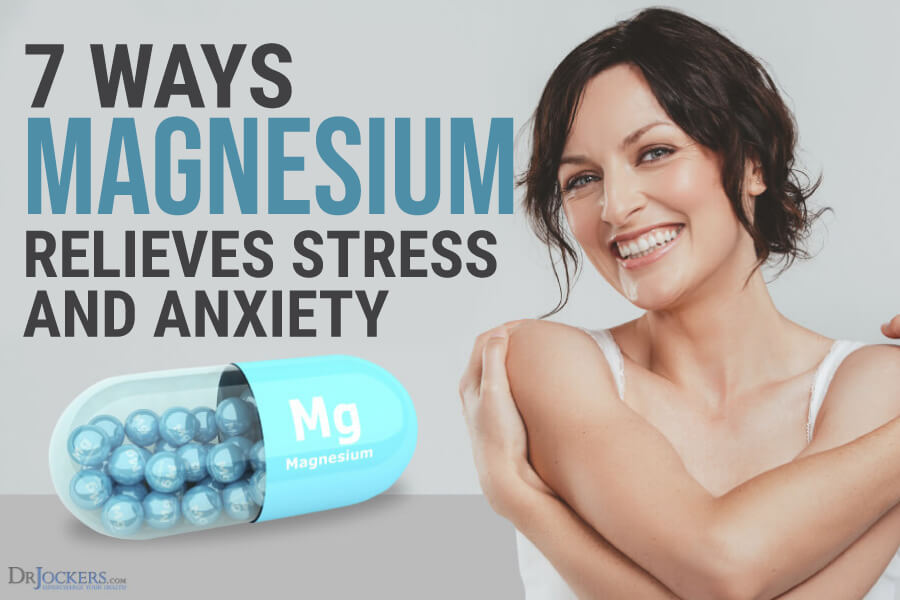 Magnesium For Anxiety: 7 Ways to Relieve Stress
Magnesium For Anxiety: 7 Ways to Relieve Stress
According to the Anxiety and Depression Association of America (ADAA), anxiety disorders are THE leading mental disorder in the US today. Despite being highly treatable, less than 40% of those suffering from anxiety seek out help (1). Although not the only solution, I have found that magnesium relieves stress and anxiety better than almost any other natural compound I have come across.
As a cheap nutritional option to combat the insidious effects of chronic stress, I think magnesium could be one of America’s most critical nutrients. In addition to relieving stress, magnesium also has an incredible capacity to improve your ability to adapt and perform at a higher level.
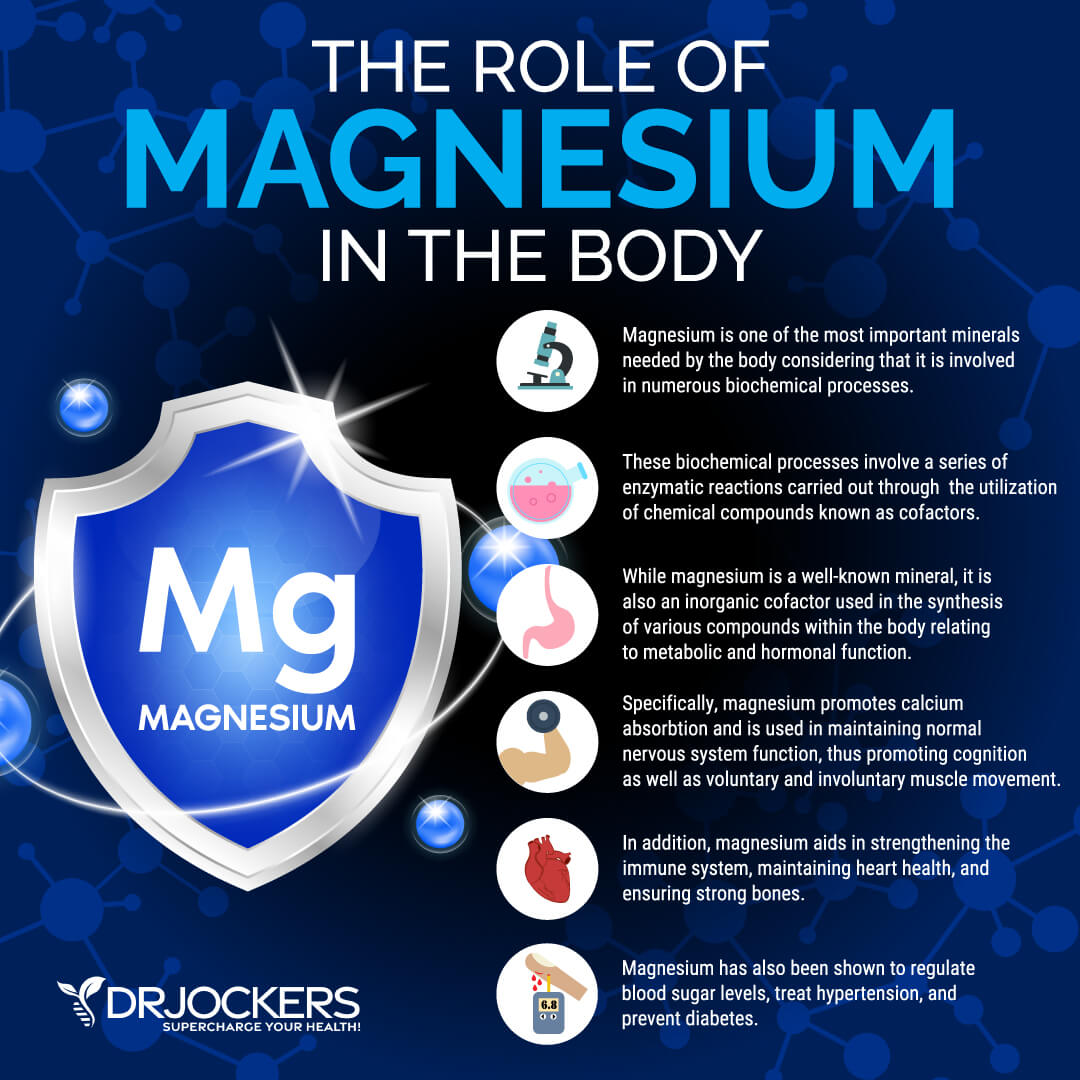
How Magnesium Relieves Stress
Magnesium has a long list of benefits for the body. Because it is utilized by over 300 enzymatic processes in the body, just making sure you get enough will help ensure you are running at your full potential. This alone will reduce stress by improving your energy and ability to solve problems in your daily life.
In addition to this, there are a number of ways that magnesium acts in the body to reduce stress and anxiety.
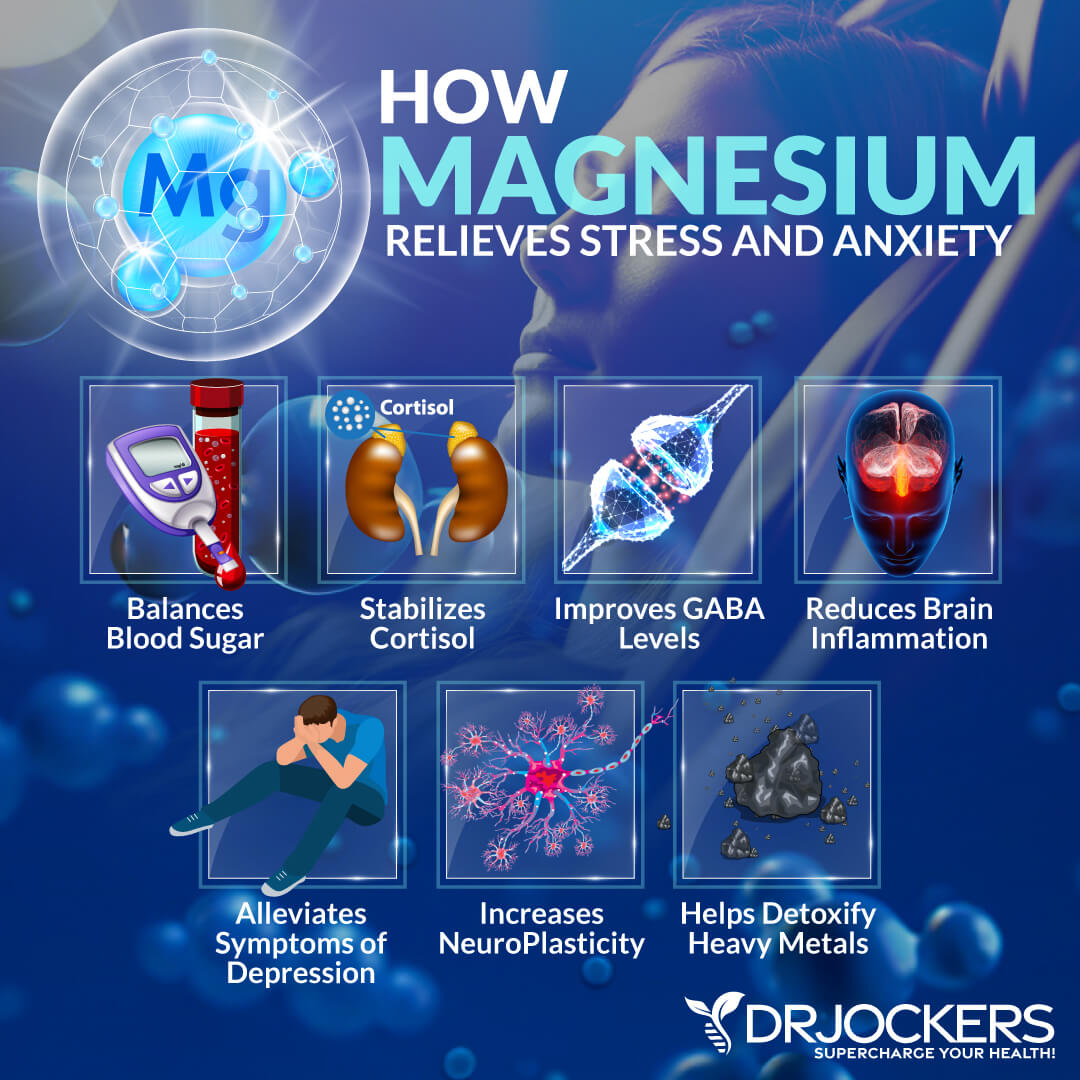
Magnesium For Anxiety – Balances Blood Sugar
If there was one factor that contributed to almost every chronic disease it would likely be blood sugar imbalance. This happens as a consequence of carbohydrate-heavy diets, sedentary lifestyles, malnutrition, and many other factors.
Rapid blood sugar fluctuations can contribute to chronic inflammation, hormone imbalances, neurotransmitter imbalances, and weight gain. All of these things can contribute to a subpar mental state, a lowered ability to handle stress, and an increased likelihood of experiencing anxiety.
One of the biggest symptoms that you are experiencing a blood sugar imbalance is something called reactive hypoglycemia. Shortly after a meal, you become tired and irritable followed by a rampant increase in hunger. Other symptoms include shakiness, anxiety, and dizziness. This condition is what we have come to know and love as “being hangry”.
In addition to following a healing diet low in carbohydrates and rich in healthy fats, magnesium supplementation has been shown to help prevent such drastic drops in blood sugar, helping to mitigate the inflammatory effects (2).
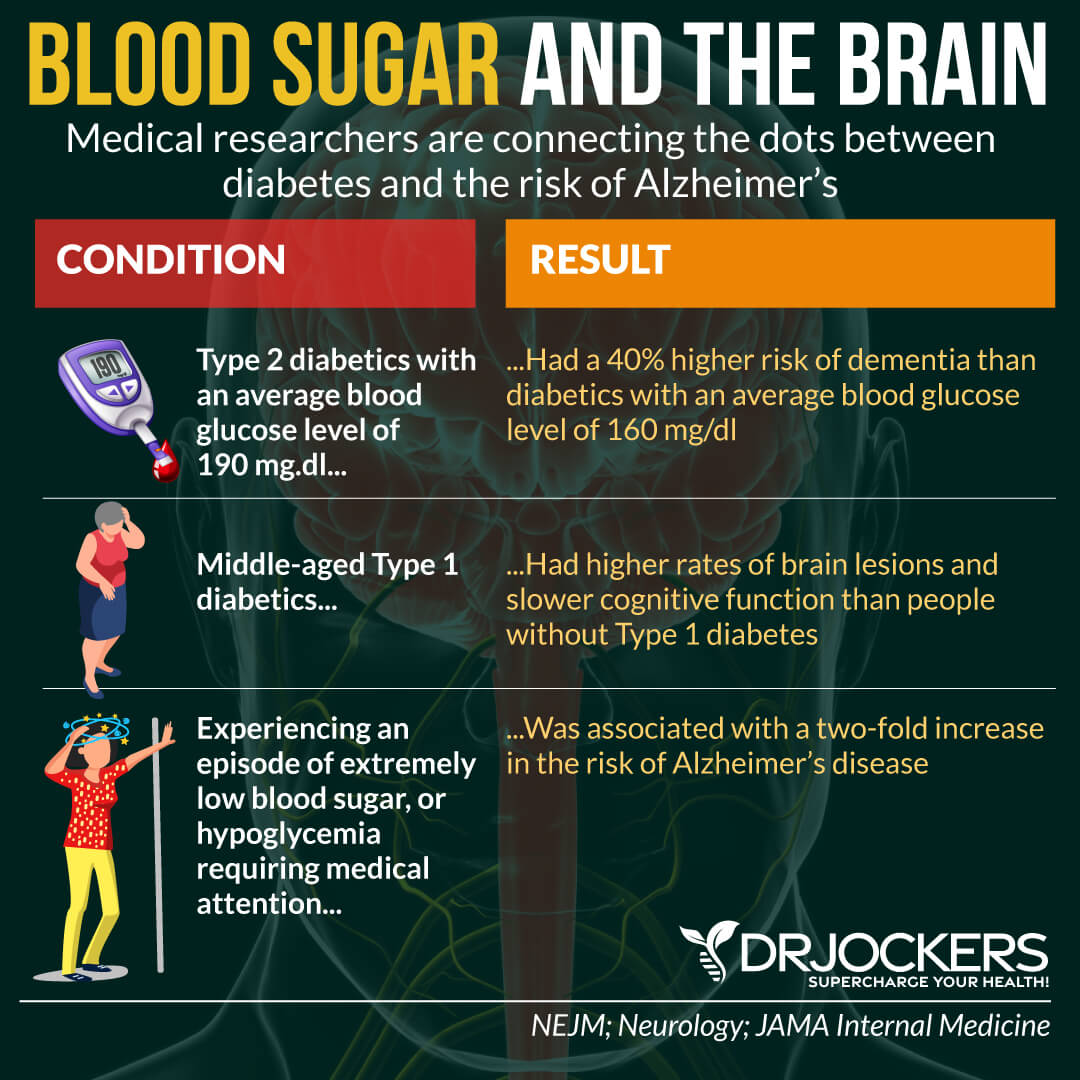
Magnesium For Anxiety – Stabilizes Cortisol
Cortisol is a hormone released in the body when we are under stress. While it has received a bad rap recently, cortisol is absolutely vital to health. When we are faced with a pressing situation that needs increased focus and energy to conquer, cortisol does this for us.
When under stress for long periods of time, however, chronic elevation of cortisol can become a problem. Chronic elevation of cortisol contributes to neuroinflammation and blood sugar imbalances that increase the likelihood of experiencing anxiety.
Chronically elevated cortisol can also contribute to depression, memory loss, and brain fog, among other mental disorders.
During these times, magnesium can help by lowering cortisol, preventing neuroinflammation, and effectively lowering the tendency of anxious feelings (3, 4).
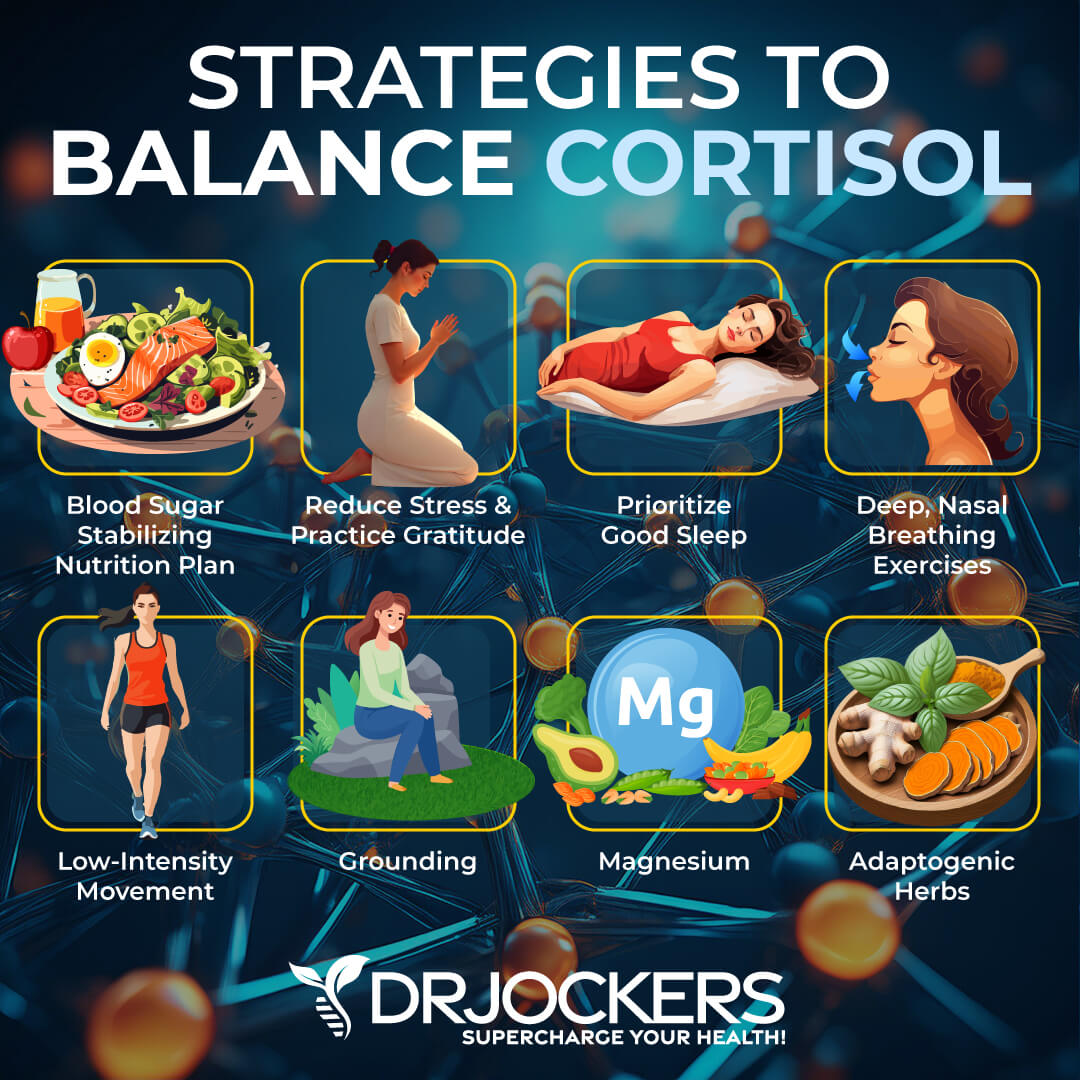
Magnesium For Anxiety – Improves GABA Levels
Mental states are heavily controlled by chemicals in our brains called neurotransmitters. When it comes to a balance between vigilance and relaxation, two neurotransmitters named glutamate and GABA are primarily responsible.
Glutamate is upregulated during times when we need to focus or be on our toes while GABA is what tells our brains to relax and rejuvenate. In our overstressed society, people tend to be glutamate dominant.
What should happen in a healthy individual is that excess glutamate in the brain is converted into GABA to help balance us out after stressful events. During times of chronic stress, we stop converting glutamate into GABA efficiently which leaves our brains in a stimulated state.
This leads to inflammation and high levels of damage to the brain tissue which is highly correlated with anxiety disorders. Magnesium supplementation helps to boost GABA production in two ways, by binding and stimulating GABA receptors and by increasing the conversion of glutamate into GABA (5).
You also rely on adequate levels of Zinc, taurine, Vitamin B-6, and glutamine to make adequate GABA, more on this here.
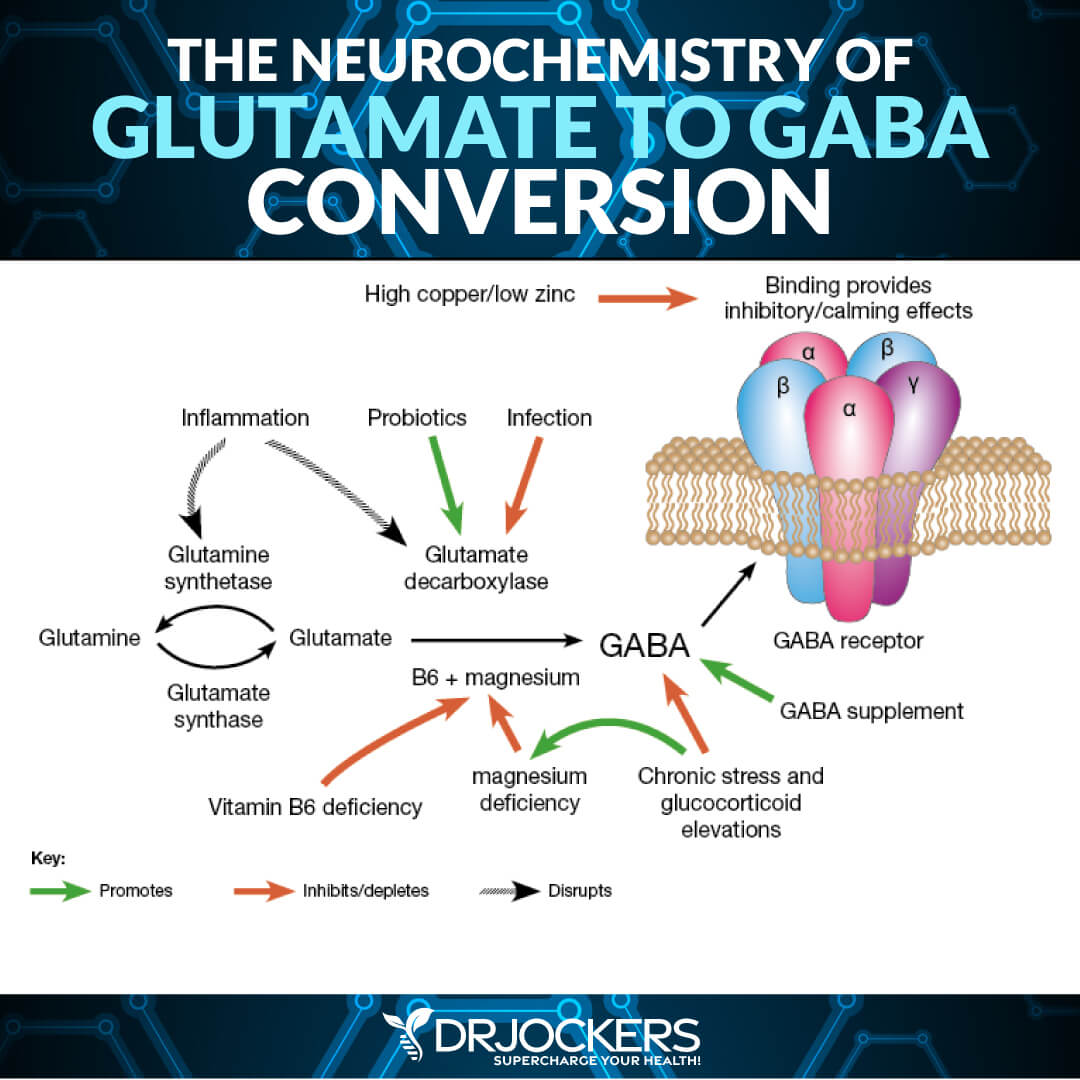
Magnesium For Anxiety – Reduces Brain Inflammation
As I have touched upon already, neuroinflammation is highly detrimental to a healthy mental state. Inflammation in the brain is thought to be one of the leading causes of anxiety and depressive disorders (6, 7).
The brain is one of the most concentrated areas of mitochondria in the body. If you are not familiar, mitochondria are structures in your cells that produce all of the energy for your body. The areas that have higher concentrations of them are indicative of the energy demands of those tissues.
Mitochondria are very sensitive to inflammation. When in an inflamed environment, they have a reduced ability to produce energy. In the brain, this can have many consequences. There are several ways this could be explained but if you think about it on a basic level, if your brain isn’t running efficiently, you won’t be able to handle the demands of a stressful life.
Magnesium deficiency is often found in those with elevated inflammatory cytokines, and inflammatory immune modulators that are also high in people with autoimmune disorders. Magnesium supplementation may help to negate this inflammatory effect.
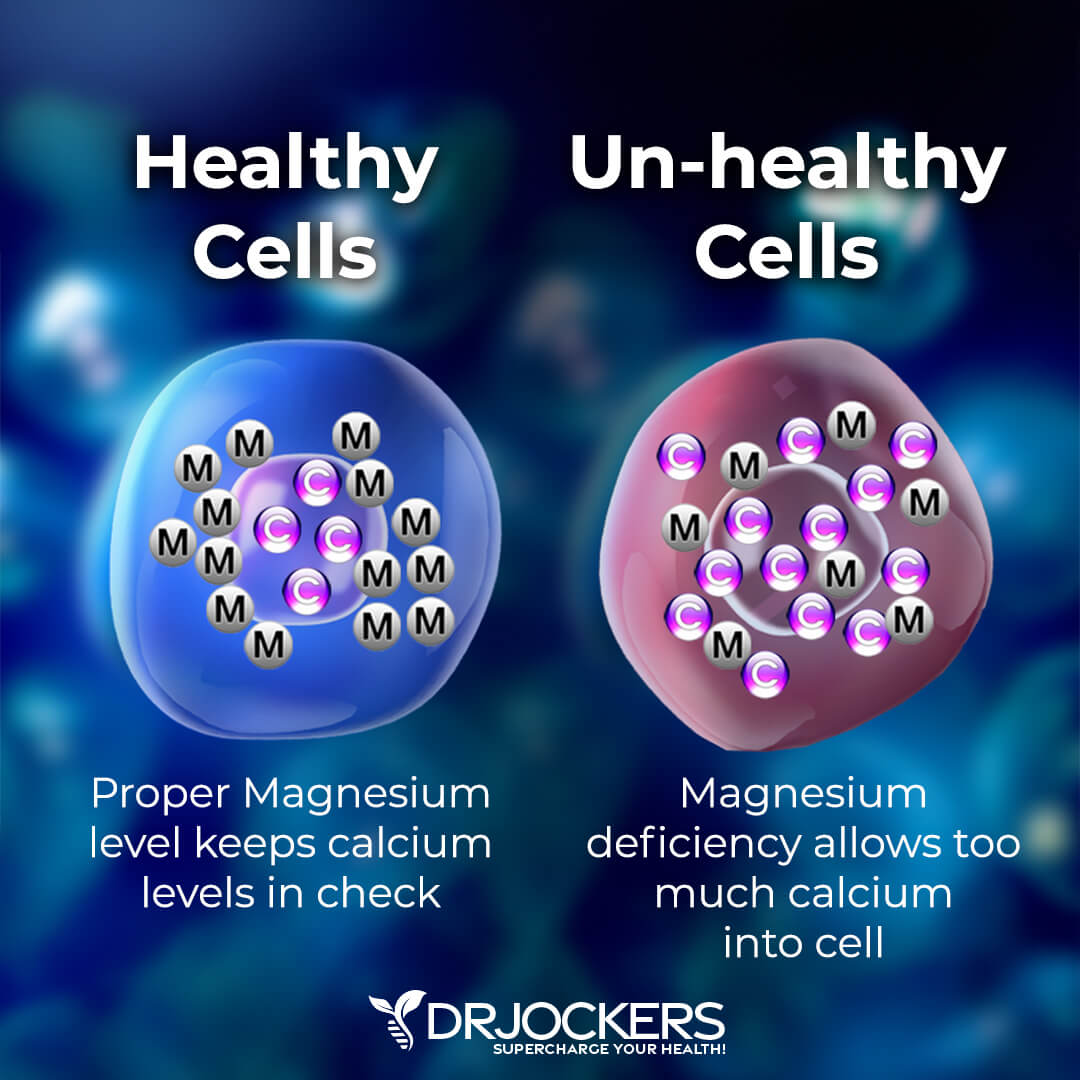
Alleviates Symptoms of Depression
Anxiety and depression are often closely tied to one another. It has been estimated that about 90% of people who suffer from anxiety, also experience symptoms of depression.
Luckily, magnesium supplementation may assist with both (8). This effect is likely achieved by helping to balance neurotransmitters, lowering inflammation in the brain, balancing blood sugar, and assisting in mitochondrial energy production.
It has been shown in one study to be as effective as pharmaceutical anti-depressants, possibly by helping to upregulate the production of serotonin in the brain (9). Serotonin is the neurotransmitter in our brain responsible for making us feel happy and content, so this is important.
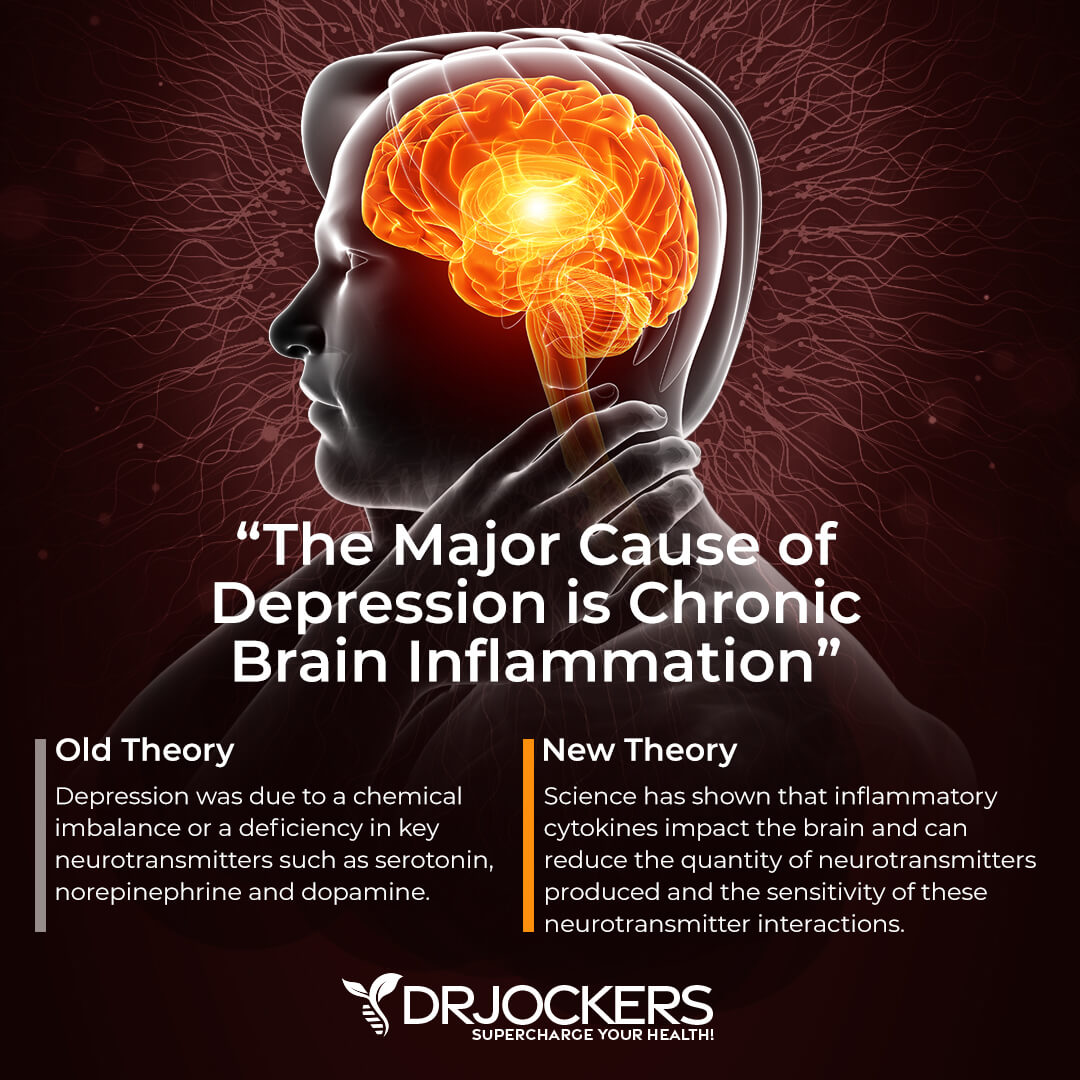
Upregulates Neuroplasticity
If downregulating inflammation in the brain is one of your primary targets in improving anxiety (and I think it should be), then increasing neuroplasticity should also be a target. Neuroplasticity is simply your brain’s ability to heal and create new brain cells.
Targeted together, lowering inflammation and increasing the formation of new brain cells will help the brain rebuild itself in a beneficial way. Magnesium helps support the production of brain derived neurotrophic growth factor (BDNF) which improves the brain’s ability to rewire itself.
Magnesium is one of the few nutrients that has been shown to support neurogenesis (10). Specifically, a form of magnesium that can cross the blood-brain barrier may be the best for this. I go into my favorite forms of magnesium at the end of this article.
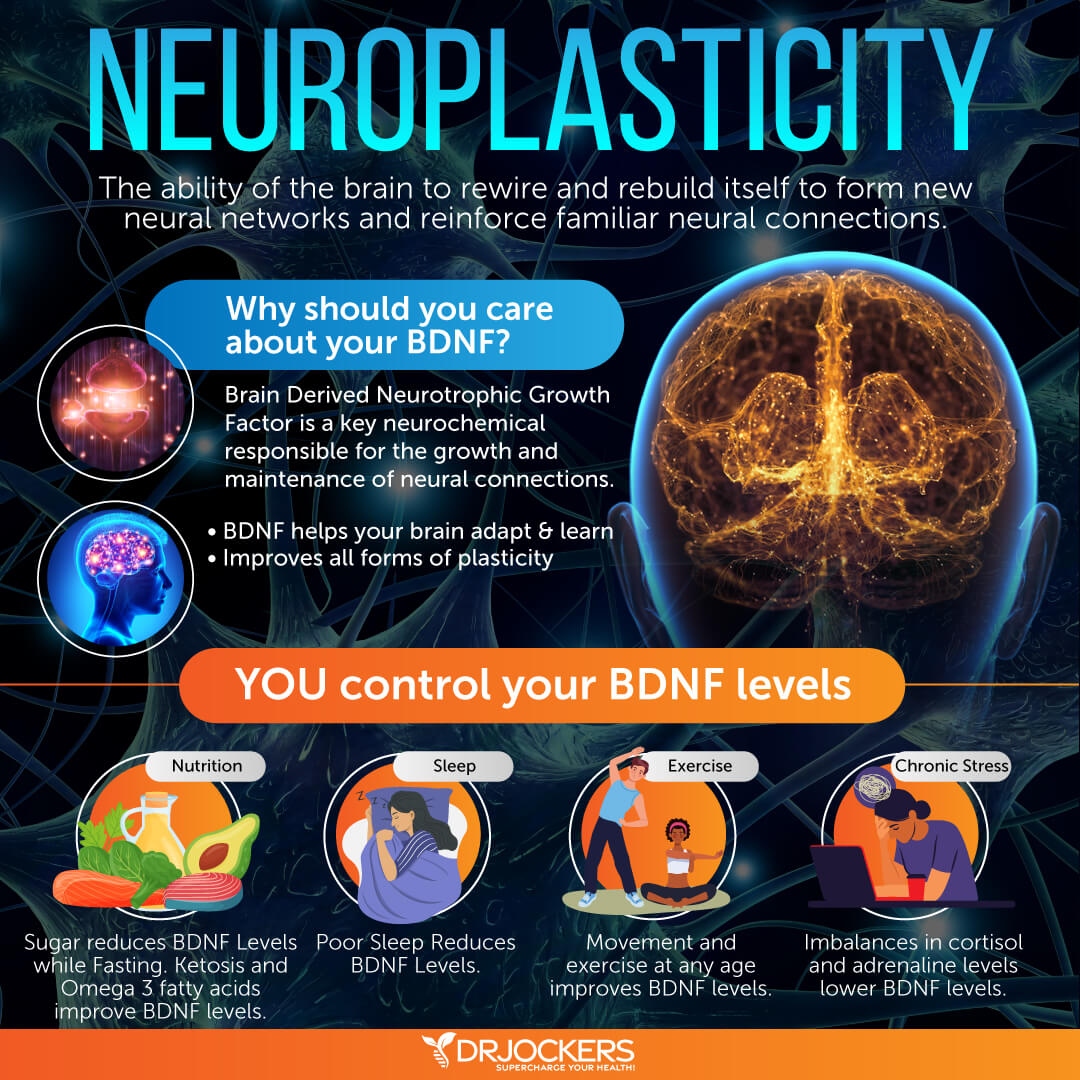
Detoxifies Heavy Metals
Heavy metals like lead, mercury, and aluminum can make their way into the brain tissues and cause massive amounts of inflammation. In fact, heavy metal exposure has been linked to anxiety in addition to a range of other neurological disorders like autism, ADHD, and depression.
Magnesium deficiency is correlated with reduced Cytochrome P450 and NADH cytochrome reductase enzymes which play a vital role in phase I liver biotransformation. It is also critical to the development of proper glutathione levels for phase II liver detoxification.
Magnesium can help with ridding the body of heavy metals to prevent them from entering the brain in the first place. It is possible that magnesium, if able to cross into the brain, could also pull heavy metals from within (11).
The Nutrient of Resiliency
In addition to the benefits listed above, I consider magnesium an all-around master mineral that improves the function of almost every process in the body. By helping the body run more efficiently, you unlock extra energy that can be used to conquer the stressors of daily life.
By unlocking the ability to conquer your stress more effectively, you will likely experience much less anxiety as you go about your day. The way I see it, you can either spend your life trying to run from stress, or you can improve your ability to overcome stress. The latter is much more realistic given the demands of life we face in our society and magnesium is one key that I use every day to unlock my own potential.

Best Forms of Magnesium
Most magnesium supplements have a low absorption and an even higher proportion of those do not even make it into the brain. When looking to improve something like stress and anxiety, you absolutely have to consider this effect.
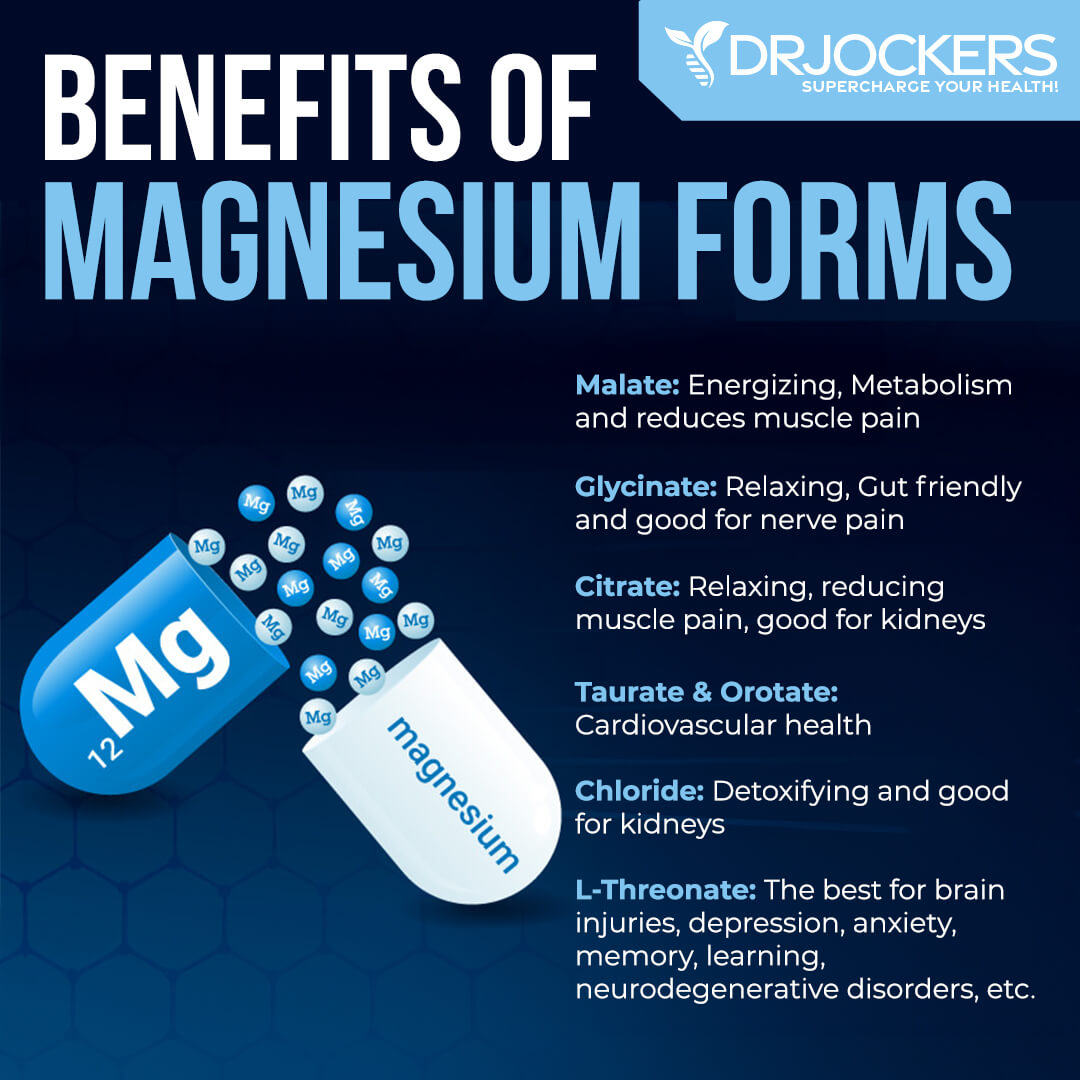
Magnesium L-Threonate
When I realized that most magnesium supplements do not provide the brain benefits they should, I decided to make my own.
A specific form of magnesium called magnesium L-threonate is the only form so far to be shown in animal studies to cross over the blood-brain barrier. Consequently, this form of magnesium has shown numerous beneficial effects on cognitive processes such as memory as well as measures of anxiety and depression.
Brain Calm Magnesium is one of the foundational supplements I recommend to just about every one of my clients, especially those dealing with increased stress. I get consistent feedback on what an immediate difference it makes in my clients’ lives just about every day.
Transdermal Magnesium
For those with GI disorders inhibiting the absorption of nutrients or those who accumulate stress as the result of localized pain in the body, topical magnesium can be extremely beneficial.
Magnesium mineral sprays can temporarily reduce pain by becoming directly absorbed through the skin and alleviate pain entirely when used over long term periods. People experiencing symptoms of osteoarthritis can benefit from these mineral oil sprays by improving the balance of magnesium in the affected area.
Spray mineral oil daily over an affected area following a shower or before bedtime. Anecdotal evidence suggests that spraying magnesium oil over an extended time duration can also alleviate cramping during menstruation.
For topical use, we have two forms of magnesium:
Magnesium Oil With MSM is great for reducing inflammation in achy joints and supporting healthy connective tissue.
Magnesium Lotion With Melatonin
This is a great solution for those who live stressful lifestyles and tend to have trouble sleeping at night. Adding in the extra melatonin along with the magnesium in a simple lotion application can work wonders on your sleep quality!
Magnesium-Rich Foods
In addition to supplementation, there should be an effort to include as many magnesium-rich foods as possible into your diet. The following are the top food sources of magnesium you should be consuming on a daily basis:
Swiss Chard
Spinach
Grass-Fed Dairy (Butter, Ghee, Raw Cheese, Raw Milk)
Avocados
Sprouted Pumpkin Seeds
Pink Salts
Nuts
Dark Chocolate (100% Cacao with no added sugar)
Wild-Caught Fish
Sprouts
Sea Vegetables (Kelp, Wakame, Nori)
Organic Coffee
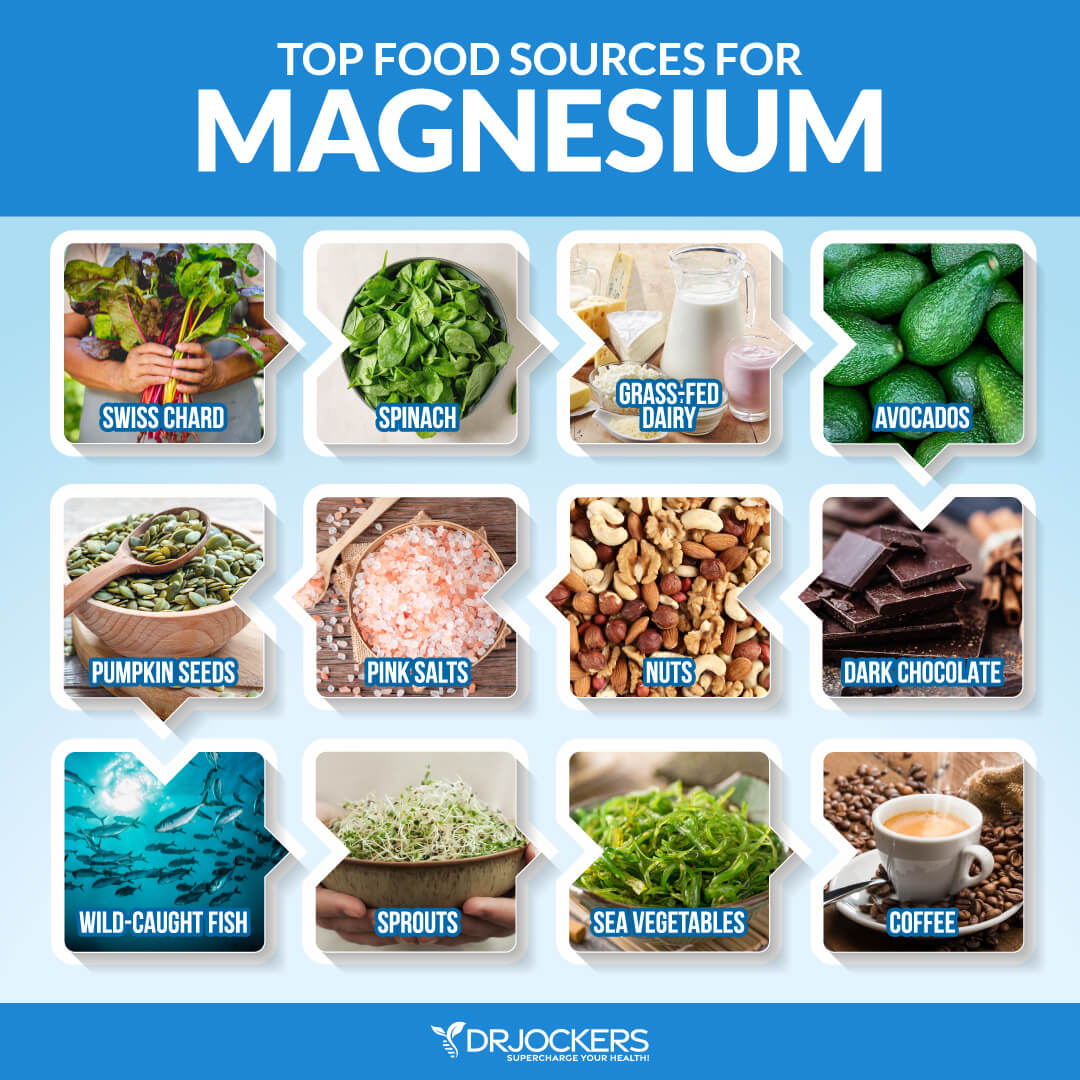
Use The Brain Tap System
The Brain Tap System is a brilliant system that helps to restore your brain’s natural ability to balance. It helps to soothe your brain. It enhances relaxation and revitalization. This system activates the vagus nerve and provides you with a range of brain waves to achieve balance.
It is an incredibly quick easy, and effective way to improve your brainwaves, lower stress, feel calm and controlled, improve cognition, experience more energy, and positivity, and feel overall healthier. Only 10 to 20 minutes a day can make a tremendous difference in your brain health, mental health, energy, and physical well-being.
Summary
Magnesium is essential to human health and intricately involved in helping the body endure heightened levels of stress. If you are a hard-charging person and tend to experience feelings of overwhelming stress and anxiety, make a conscious effort to increase your magnesium uptake and you will notice just how powerful this little mineral can be.
If you want to work with a functional health coach, I recommend this article with tips on how to find a great coach. On our website, we offer long-distance functional health coaching programs. For further support with your health goals, just reach out and our fantastic coaches are here to support your journey.
 Inflammation Crushing Ebundle
Inflammation Crushing Ebundle
The Inflammation Crushing Ebundle is designed to help you improve your brain, liver, immune system and discover the healing strategies, foods and recipes to burn fat, reduce inflammation and Thrive in Life!
As a doctor of natural medicine, I have spent the past 20 years studying the best healing strategies and worked with hundreds of coaching clients, helping them overcome chronic health conditions and optimize their overall health.
In our Inflammation Crushing Ebundle, I have put together my very best strategies to reduce inflammation and optimize your healing potential. Take a look at what you will get inside these valuable guides below!
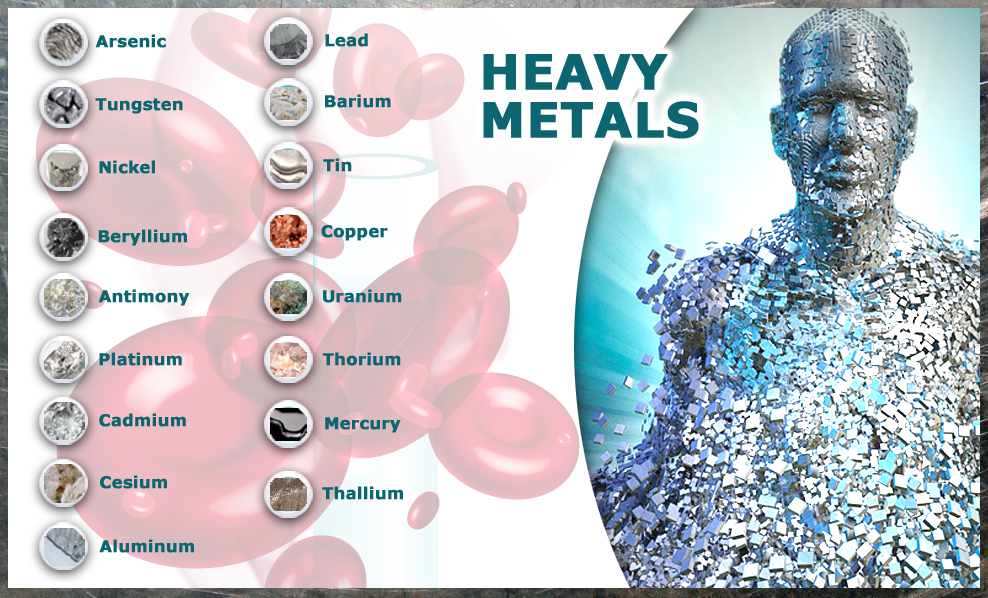








Knew much more from your topic. Thanks
I have suffered with constipation and insomnia all my life. It’s worst now I’m postmenopausal. I worked nights for 34 years which didn’t help. Nothing seems to help, I done just about everything and taken many supplements!! Just finished a magnesium citrate but it didn’t help and gave me bad headaches upon waking! i believe i have a thyroid disorder yet doctor would not do in depth testing, just the normal. Normal is considered between 0 to 5, my range was almost at 0!!!! yet supposedly normal. I did the temperature test and it fell at between 94 to 97.5 never at 98.6. I did it for two weeks. I have had all the symptoms associated with low thyroid function. ALL!!!
So sorry to hear about this Elizabeth! You may want to consider doing some health coaching. You spent many years breaking down your health and will likely need a planned approach to building it back up! Reach out to michael@drjockers.com if you are interested.
Hi Elizabeth,
Having a doctor not willing to do testing beyond TSH sure sounds frustrating. I’ve been helping friends and family get advanced thyroid testing. Please reach out to me if you’re interested in advanced thyroid testing (I don’t get referral fees) or would like to chat.
All the best,
David.
david@davidsdirectory.com
Hello r. Jockers
Magnesium is a very important mineral especially for women, it can be a great help in menstrual pains accompanied by vitamin B6
I have PVC’s Would Magnesium help? What would be the proper dose to start with? Love all of your information.
Yes it could Joy! It depends what the underlying cause is but you can experiment! I’d start with one scoop of this per day: https://store.drjockers.com/collections/top-sellers/products/brain-calm-magnesium
my knee started aching lately, so i took a double dose of magnesium for a few days and voila, the pain is gone (double=800mg)
Hey Vacheslav, I’m glad to hear the pain went away!
Thank you for the article. How do you know how much magnesium to take and is it possible to take too much? I know it’s good for you but if you blood work comes back and says your magnesium levels are good but you have the anxiety and depression, do you still need to take magnesium?
Hey Missy, there are certainly other causes of anxiety Missy. You could try magnesium foot baths before bed and some of the tips in this article: https://drjockers.com/14-ways-reduce-anxiety-naturally/
I can not seem to take enough or the exact magnesium for my feet and calf cramps. Doing all the tricks water, electrolytes, food, magnesium citrate & potassium, calm. Help!
Maybe try magnesium chloride foot baths Judith!
Thank you so much for this informative article! I love everything that you put out and I especially love your positivity and the recognition you give God. Your family is so beautiful and it’s so fun to see your boys growing up! May God’s blessings continue to be poured out upon you!
Thank you for reading Elvera! Blessings!
So I’m not seeing any info in this article regarding mag & joint health. I have been under the impression that mag helps the body appropriately use calcium. Even redistributing mis-appropriated calcium from joints & even stones (gall bladder, kidney) I’ve had Lyme for most of my life & realized that mag is really important to support joint health along with MSM. So, although I will experience some intermittent pain I tend to be pain free & my joints are in very good condition as long as I get a balance of calcium, mag chloride & MSM & treat any invasive coinfections.
Awesome article in all other respects. I finally became generally pain free (joint, muscle & nerve) when I really took the use of magnesium seriously. I prefer to use mag chloride for all applications (external & internal)
Yes it is great for that Shannon! Thanks for sharing!
I struggle with severe anxiety and depression. What kind of mg suppplement should I try? Please and thank you!!
Sorry to hear this Paige! I would recommend using Magnesium L-threonate in the form of Brain Calm Magnesium here: https://store.drjockers.com/products/brain-calm-magnesium
Dr. Jockers, what about the brand CALM by Natural Vitality? Is that going to be beneficial at all?
Yes you can use that but it isn’t the best form for impacting brain health and anxiety. I would go with the Brain Calm magnesium for that.
If a person wants to deal with several issues, do I have to take several forms of magnesium? I have fatigue, thyroid calcium deposits, muscles aches, and memory stuff.
fatigue? then have sulfur and magnesium and hydrogen water and you will no need coffee, also make sure the wifi is off ..
Hi Michael, I am sorry to hear this. Yes, different forms of magnesium are beneficial for different conditions. This article discusses in more detail.
Is magnesium supplement good for Parkinson’s?
Yes absolutely Beverly!
Hi I am suffering from migraine is it really helpull for me as well…
Yes absolutely this would be very helpful!
Dr Jockers
What are the different kinds of magnesium and their benefits please?
Here is a helpful article on that topic: https://drjockers.com/best-magnesium-supplement/